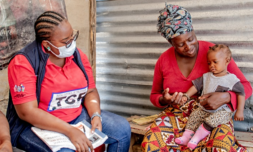The country is finding heartwarming ways to integrate its large elderly population within wider society.
Japan has one of the oldest populations worldwide. As a result, age related ailments are a growing issue across the country. And diseases like dementia pose a problem for a government increasing efforts to keep the elderly integrated within society.
But despite these hurdles, the rest of us could learn a thing or two from the East Asian island.
Plans to ensure the elderly feel included (and, crucially, useful) are becoming ever more creative. And the most recent strategy by a small Japanese cafe has warmed hearts across the internet.
‘The Restaurant of Mistaken Orders’ in Tokyo hires elderly dementia sufferers as servers, embracing the mishaps that inevitably follow.
The business aims to give those with dementia a safe space to be productive and meet new people, in keeping with national efforts to do the same.
Despite mix ups and long waits, customers never complain or make a fuss, instead making workers feel supported and welcome.
The 12-seat cafe in Sengawa, a suburb in western Tokyo, prevents its employees from falling into hospitals and care systems before they need to. Organisers work with the local government to get in touch with dementia patients in the area.
Servers certainly seem to be feeling the benefits of this inclusive environment.
‘It’s so much fun here. I feel like I’m getting younger just being here’ said Toshio Morita, a server who began showing symptoms of dementia two years ago.
Productivity and a feeling of being needed have been proven to slow down the progression of dementia symptoms. This is vital to ensuring patients are healthy for as long as possible, given the neurodegenerative condition has no cure.
Around 30% of the Japanese population is over 65, and more than 6 million people in the country are estimated to have dementia. This number is expected to grow to as much as 7.3 million by 2025, according to the health ministry.




















